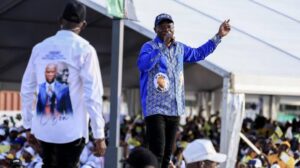In what many are calling a foregone conclusion, Gabon’s transitional leader, General Brice Clotaire Oligui Nguema, has officially secured the presidency with a staggering 90% of the vote, according to provisional results announced by Interior Minister Hermann Immongault.
The election, held on Saturday, marks a major milestone for the 49-year-old general, nearly two years after he orchestrated the military coup that dismantled the Bongo family’s decades-long grip on power. The Bongo dynasty, which began in 1967 with President Omar Bongo and continued through his son Ali Bongo, was abruptly brought to an end in 2023 when Oligui, then head of the elite Republican Guard, took control.
According to official figures, over 575,000 ballots were cast in Oligui’s favor, giving him a firm mandate for the next seven years. His closest rival, Alain-Claude Bilie-by-Nze, garnered just over 3% of the vote.
While authorities and some observers have praised the election as peaceful and transparent, critics argue that the process was far from competitive. A new constitution and revised electoral code, both introduced ahead of the vote, were seen by many as tailor-made to ease Oligui’s path to victory. Key opposition figures who might have mounted a serious challenge were excluded from the race altogether.
Also, read: Rwanda Bans Belgian Curriculum Amid Deepening Diplomatic Rift
Concerns were also raised about the integrity of the process. Bilie-by-Nze expressed alarm over reports of unsecured, unmarked ballots and voting delays at some polling centers. In some areas, registered voters struggled to locate their assigned polling stations, raising questions about logistical preparedness.
Despite these issues, the government boasted a voter turnout rate of over 70%, interpreting it as a sign of national confidence in the transition and Oligui’s leadership.
Now officially at the helm, Oligui faces the daunting task of rebuilding trust in Gabon’s institutions and addressing systemic corruption that flourished under the Bongo regime. Though rich in oil and timber, Gabon remains burdened by stark inequality. About 35% of its 2.5 million citizens live on less than $2 a day — a striking paradox in such a resource-rich nation.
Oligui has positioned himself as a reformer, vowing to rid the country of mismanagement and graft. His ascension has been welcomed by many Gabonese who yearned for an end to what they saw as a stagnant political dynasty. Charismatic and well-spoken, the former Republican Guard commander has cultivated an image of a disciplined leader who understands both power and the people.
Oligui’s overwhelming victory may have given him political capital, but in a nation where hope has long been shadowed by broken promises, the people will be watching closely.

